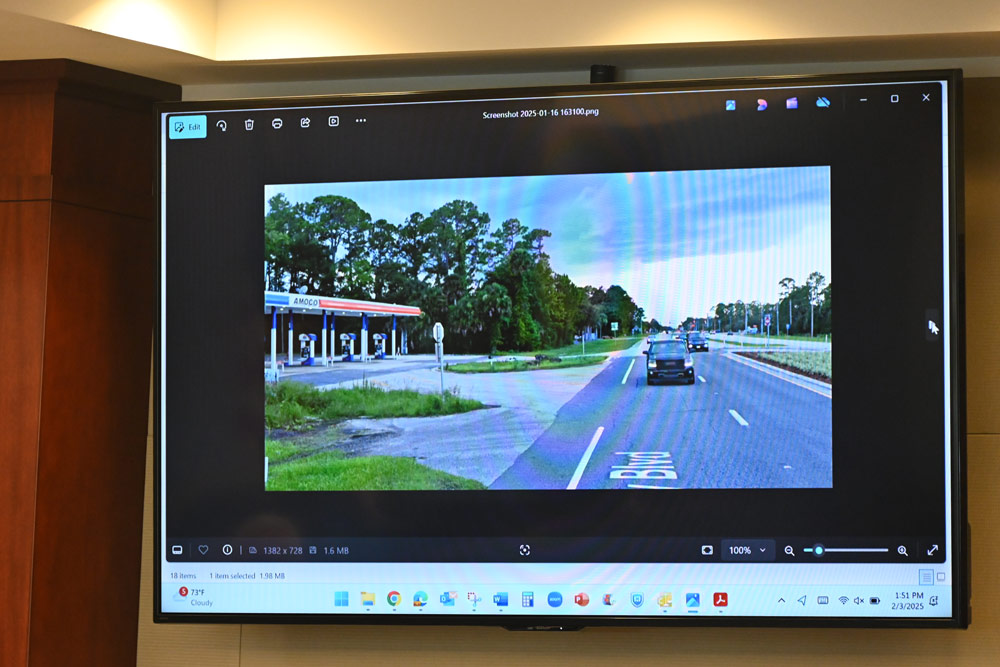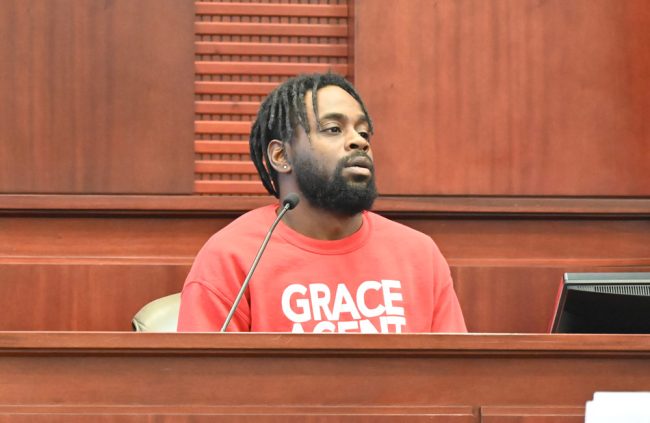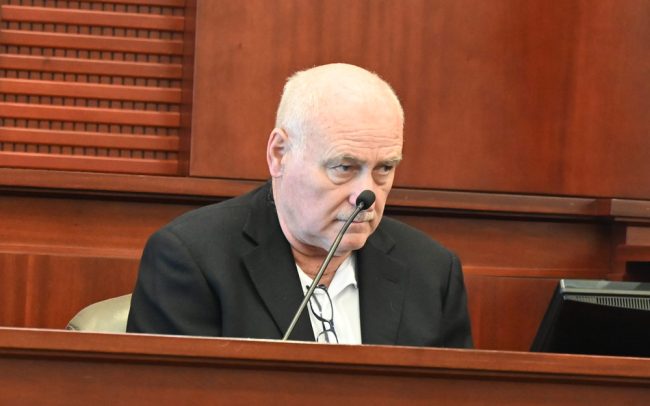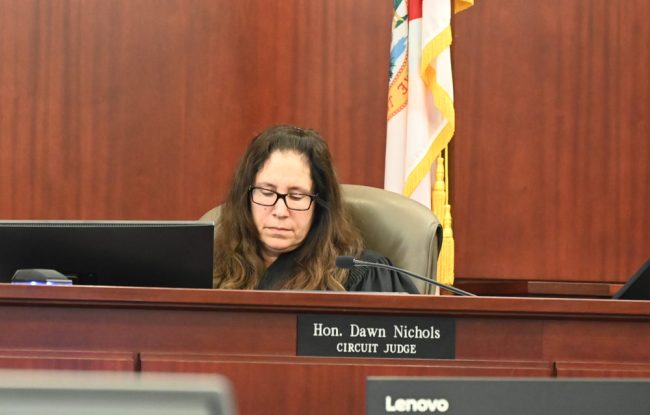
Last Updated: 4:40 p.m., Feb. 5
Eric James Cooks, a 35-year-old resident of Palm Coast’s P Section and formerly a supervisor at healthcare’s crisis-stabilization unit, where Baker Acts are triaged, lost a Stand Your Ground motion in circuit court Monday, clearing the way for his prosecution on a felony count of battering a man older than 65. Had he won, the case would have been dismissed.
The case touches on several elements that blur the line between good samaritanship and road rage, between the meanings of self-defense and provocation, and with an overlay of race and age disparities.
The case is the result of a strange confrontation between Peter Poznerowicz, 66 at the time, and Cooks outside the Amoco gas station on State Road 100, just before I-95, on Oct. 26, 2023. Cooks doesn’t dispute that he punched Poznerowicz. But he says he did so in self-defense, as Poznerowicz had been aggressive toward him and appeared to be reaching for a weapon.
Circuit Judge Dawn Nichols did not buy it after a nearly two-and-a-half hour hearing Monday. In a Stand your Ground motion, the burden is on the prosecution to show that self-defense was not a factor. In Nichols’s ruling, Assistant State Attorney Tara Libby did so, and the third-degree felony charge against Cooks remains. If he goes to trial and loses, he could be sentenced to up to five years in prison, be adjudicated a felon, and lose his job.

Nichols does not want to see that happen. She did not agree that stand-your-ground applies. But she did not think Poznerowicz as entirely innocent as he is made to seem in the sheriff’s report of Cooks’s arrest, or Cooks as guilty of a wanton assault on an older man. There were also numerous contradictions between the sheriff’s report of the incident and testimonies on the stand. “It appears to me, it was a stupid judgment call, tempers on both sides, then it became violent,” the judge said. “I’m hoping that there’s a way to resolve it.”
Nichols all but aid out a roadmap for the two sides: probation, anger management, and safeguarding Cooks’s job, which implies no adjudication. It would not be unusual. In fact, it would be common: an individual pleading to a third-degree felony typically will get probation, not jail time (let alone prison time), and in most cases, the judge will withhold adjudication, sparing the individual the lifetime designation of a felon.
Libby was not interested. She was offering nine months in jail and adjudication. That leaves Cooks with two choices: risking a jury trial and the optics of a young Black man getting out of his car and punching an older white man who was on his bike–a young Black man who did not come off too well during his testimony Monday, his statements sounding overly self-justifying than caring. Or he could tender a open plea, which would leave it entirely to the judge to impose a sentence. (A negotiated plea would be with the prosecution, which appears to be a no-go for Cooks.) Cooks, who is represented by attorney Josh Davis, may be leaning toward an open plea.
Cooks was also less than forthcoming when he was on the stand. He left the impression that he was still employed at SMA Healthcare. His attorney had asked him: “What do you do?” Present tense. Cooks answered he “ran” the crisis stabilization there. That’s the job the judge would like to see safeguarded.
In fact, Cooks was fired in March 2024, an SMA spokesperson said. (The original version of this article on Tuesday had incorrectly reported Cooks’ statements to mean that he was still employed there.) Even the prosecutor appeared unaware of the fact.
Peter Poznerowicz was an avid cyclist, riding 35 to 45 miles a day several times a week, sometimes 200 to 250 miles a week. That morning he left his E Section house as usual, in his biker’s gear. As he was riding south Belle Terre Parkway, choosing to ride along the white stripe on the right side of the road rather than on the bike path (he boasted in court of being able to ride on the white stripe without wavering), he testified he was nearly run off the road by a car. He couldn’t tell who it was. He rode on.

He headed toward the beach on 100, as he usually does, again riding on the road, in that segment because there was no bike path at the time (it was built last year, months after the incident). As he was approaching the Amoco station, he saw Cooks’s burgundy Ford Fusion veer into the Amoco station from the entrance closest to the Interstate then loop around rapidly and emerge right in front of him, as he was approaching the other entrance. The vehicle stopped so abruptly in front of him that he had no way to turn to avoid it, though his bike did not strike the car.
“The guy jumped from the car and punched me in the face,” Poznerowicz said. Cooks punched him once. He’s not disputing that. “When I wake up, I saw two people, and I saw a few seconds later police officer and a medic was there.”
Cooks tells a somewhat different account. He was on his way to work. He would have followed the same route as Poznerowicz–Belle Terre to 100. Along the way he noticed cars blowing their horns at a biker, who turned out to be Poznerowicz. He kept going. He pulled in to RaceTrac, got gas, pulled back out, then noticed Poznerowicz again, this time gesticulating. “It’s not strange for me to see people having episodes on a daily basis,” Cooks testified, drawing on his experience at SMA. “He looked like he was having some type of episode.”
Did you think he was in some sort of trouble? Davis asked him.
“At first, yes,” Cooks said. Cooks said he pulled into the Amoco station to check on the man, figuring the Amoco parking area would be a safe place to do so, though he actually rode his car almost back to the road, getting in Poznerowicz’s way. “He was obviously frustrated and it seemed like he was confrontational. At that point he kept riding toward me,” Cooks said.
The gas station attendant, who was outside when Cooks veered through the lot, described his driving as aggressive. She did not use the word provocation. But Poznerowicz, in a somewhat broken but expressive English (a Polish interpreter was standing by, but was never used) had seen the car’s surge in front of him as a form of provocation:
Once Cooks opened his car door, he said Poznerowicz’s bicycle hit the door. If Cooks is trained in de-escalation, as he would or should be in a crisis unit at SMA, the words he used to describe what he told the gesticulating stranger who may be having an medical episode did not sound like de-escalation: “I stated to him, I don’t know what your problem is and what the situation is today,” Cooks said. No sooner had he begun to say that than Poznerowicz pushes him, then allegedly reaches back for something. Cooks thought it was a gun. (In the arrest report, Poznerowicz had told a deputy that he sometimes carries a gun, but wasn’t carrying one that day. None was found at the scene. On the stand, Poznerowicz said he “never” carried a gun while biking.)
Cooks punched Poznerowicz. Had Poznerowicz said anything to him? “Never got a chance,” Poznerowicz testified.
Cooks said: “When he was approaching me in the angry manner, and once he actually made physical contact with me, from my understanding in the field I’m in, that is a direct threat.”
Cooks then got back in his car and drove off. He said he didn’t want to be late for work, and he didn’t want to risk being seen as “the bad guy”–an understandable fear that Blacks routinely experience, and that whites far less so, where help may be interpreted as aggression, though whether that was the case at the Amoco station is unclear. What is clear is that a man who’d been talking to the station attendant from his car closer to the store portion of the lot immediately got out of his car and walked toward the two men.
Surveillance video captured a portion of the confrontation–Poznerowicz shoving or pushing Cooks, but not Cooks punching Poznerowicz, as they had moved just enough that the camera’s field of vision was blocked by a gas aisle. The sheriff’s deputy who investigated the incident concurred in his report and on the stand that Poznerowicz had first made physical contact, though without diminishing Cooks’s aggressive driving and exit from his car, toward Poznerowicz.
It didn’t play in Cooks’s favor that, before starting his testimony, he explained to the judge that he’d recently been diagnosed with a form of Tourette’s Syndrome, which Davis told the judge might explain his involuntary expressions or at times compulsive eye-twitching. Judge Nichols was skeptical. She asked for documentation. There was none. She asked when he’d been so diagnosed. He said only recently. She later said she was unconvinced that the eye-twitching was related to a neurological condition of any sort. And in any case, nothing about Tourette’s will be allowed into evidence before the jury absent documentation.

Testimony over, Davis declined to make any arguments to the judge. Libby had barely started to do so when the judge ruled: motion to dismiss denied.
Cooks and Davis might have seen that as a loss. It wasn’t, considering what Nichols said next, and repeated: “I don’t know if y’all can come up with something that either puts them on probation, some supervision, anger-management class, but also permits him to be able to keep his employment. It’d be a good way to resolve the case, if possible.” That’s when she called it a stupid judgment call. The judge was concerned about “several” prior battery charges, according to Libby, though all dropped.
Poznerowicz had sat through the hearing in its entirety, sitting in a front pew.
“I did not get a sense of the victim in this case being in any way vindictive, in any way, shape or form,” Nichols said. “He went through something very traumatic.” he video, she said, shows the anger. “There does need to be sanctions, and there does need to be something done for what happened here, for what allegedly happened. Again, the video is blurry, and I don’t know what a jury is going to do with this. A jury may not find that it meets the burden. So I’m hoping, with that information, y’all can resolve it. If not, it’ll be up to a jury.”





























Laurel says
Mediate.
JimboXYZ says
As much as there are cyclist on the road, slow down & go wide of them. The growth in that area has made SR-100 anywhere a crappy ride on a bike. Only getting worse with the Seminole Woods development. More cars on the road, and since it’s residential there are going to be residents that eventually populate that area on bikes, all ages at that. SR-100 is going to become like anything Volusia county has for the I-95 ramps to beachside. or deeper woods inland. Remember that on one side they built an overpass for pedestrians & bicyclists. When all that was approved, the city councils involved knew exactly what they were creating for a mess. That Amoco station has always appeared to be a shuttered business until recent years. This is the Vision of 2050 bumper to bumper gridlock on SR-100. The speed limit has to stay at 50 mph for off peak traffic, that means during the peak traffic hours it’s a school zone for anyone driving SR-100.
COOKED GOOSE says
I hope it goes to trial…this was a road rage incident. Mr. Cooks stated that other cars were “blowing their horns” at the elderly man on the bicycle….well none of the other cars hunted the man down as Mr. Cooks did. Mr. Cooks is a lying thug in my opinion….he knocked the old man out cold….that is RAGE. I feel sorry for the old guy ….I bet if he wasn’t sucker punched he would beat Mr. Cooks little shrimp a$$. A true big man with dignity would never attack the elderly.
MAT says
Perhaps a “reminder “ by the Sheriff’s Office, or a specific County Code enacted, to compel bike riders to use alternative bike paths when available. Our roads are too crowded now, and huge amounts of taxpayer’s monies have been spent to accommodate bicyclist. There are also traffic laws regarding creating a traffic hazard.
Matt says
There are also traffic laws giving bicyclists a 3 foot clearance that all vehicles must adhere to & the bicycles have the right of way, similar to any pedestrian on a roadway.
As a cyclist with similar riding style as the one in this story, I can tell you from many separate incidentients over the years, the average driver on the road is rude & uncaring for the safety of any cyclist & often violate a cyclists right of way. This is self evident by the reported “honking” at the cyclist in this story. the cyclist has a right to be there, the same as the car but the car should give way to the cyclist.
That does not sound like what happened here.
Larry says
Questionable if there was any honking.
Land of no turn signals says says
This fish stinks from the head to the tail.
Edward says
It sounds to me a 66 year old bicyclist riding in the wrong direction of the roadway on the white line demarking the start of the shoulder was looking for a confrontation with a driver. Road conditions and traffic are bad enough here in Flagler County, without some 66 year old stating his tires never leaving the white line. The elderly man not having sense enough to realize his tires are only 1” wide, yet his body extends into the travel lane by at least a foot, impeding the movement of traffic. Creating just one further obstacle the drivers have to contend with on the busy streets in this county.
Don’t understand what the judges problem is, the elderly man struck the younger man, that’s assault regardless of age, his reflex was to reach back for a gun I imagine he regularly caries, fortunately not that day.
The young man charges should be dismissed, and the prosecuting attorney should be admonished by the judge for playing the elderly card.
Knuckle Sandwich says
Everyone’s worried about him losing his job, but he needs to not be employed there regardless of the outcome of this case. Just leaving the scene is enough to charge (and convict) him with a felony, and shows a level of character and constitution (and manhood) that is near non existent. No, he needs to be begging for mercy with the court, take the punishment, and figure out how to move to the other side of the country and find a job mopping floors at the local Salvation Army.
Atwp says
Love some of these bad comments. People have their reasons to say what they say. After seeing the pictures I say young man, I feel sorry for you. Especially after seeing the picture of the elder man, am very sure the young man will probably go to prison. A young black man, an elderly white man go figure. Some people say the young black man was completely in the wrong, am sure that isn’t the case. This is the Bible preaching, lying, killing, pro white country. Yeah young man prison awaits you. Please all Black Folks be careful, this country will put you in prison for all most anything, we can’t help our color, but we can help how we act and carry ourselves. Just because prison awaits black folks doesn’t mean we have to enter. We must watch how we carry ourselves.